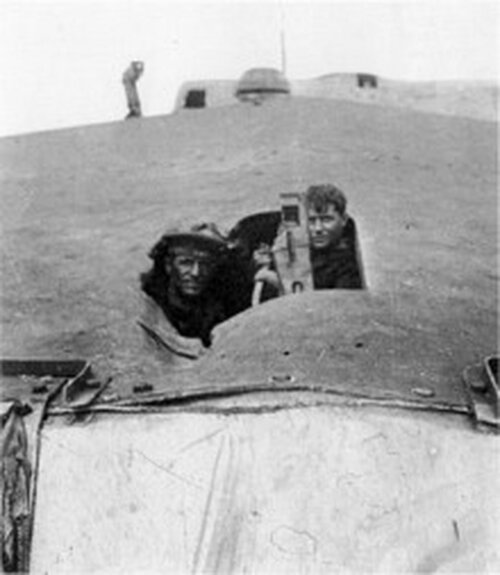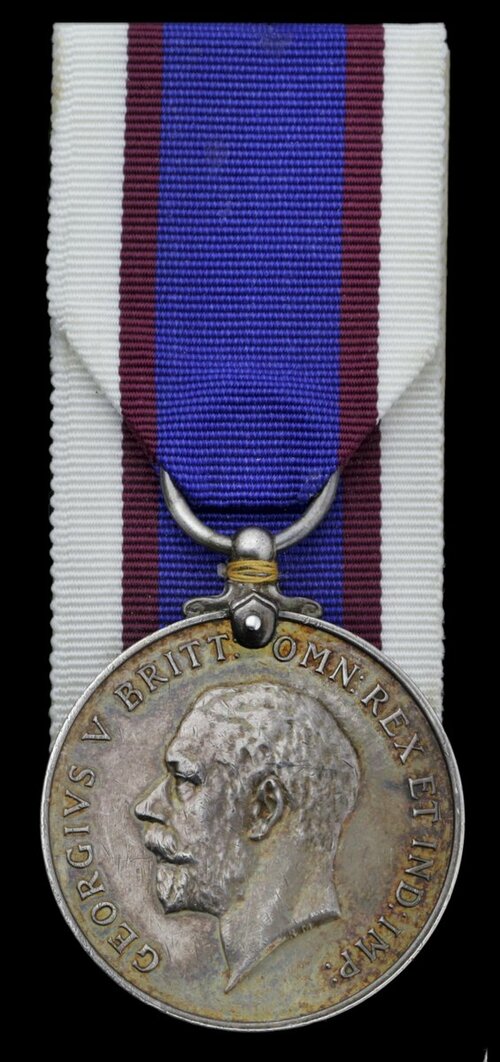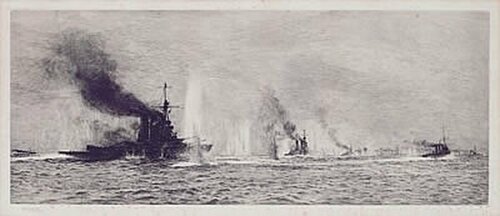Auction: 20003 - Orders, Decorations and Medals
Lot: 561
The Royal Fleet Reserve L.S. & G.C. Medal awarded to Able Seaman J. Batten, late Royal Navy, who served in the battle cruiser H.M.S. Tiger for the duration of the Great War
Hit a total of 17 times during the battle of Jutland, Tiger suffered the loss of 24 men killed and 46 wounded. Notwithstanding such severe punishment, she delivered over 300 shells from her main armament and a further 136 rounds from her 6-inch guns, inflicting telling damage on the Moltke, Wiesbaden and Von der Tann
Royal Fleet Reserve L.S. & G.C., G.V.R., coinage bust (222981 (DEV. B. 9090) J. Batten, A.B., R.F.R.), minor official correction to R.F.R. number, light edge bruising, better than very fine
John Batten was born at Donnghadee in Co. Down on 4 July 1887 and entered the Royal Navy as a Boy 2nd Class in October 1902. Advanced to Able Seaman in May 1906, he was serving in H.M.S. Defiance at the outbreak of hostilities in August 1914 but, in the following month, he removed to the battle cruiser Tiger; he remained similarly employed until the war's end.
He was consequently present at the Battle of Dogger Bank on 24 January 1915, when the Tiger's eight 13.5-inch guns did great execution, not least in a protracted duel with the Moltke and the Seydlitz. However, the Tiger, in common with Beatty's flagship the Lion, did not escape unscathed, as evidenced by her Captain's description of the time when she received her third hit from a large calibre shell:
'Tiger steered in the direction of the fleeing enemy and then, at this very critical moment, when quick decision had to be made, when the great speed of the Germans meant that every second brought them nearer to safety, there occurred a very large explosion which rattled us all in the conning-tower very considerably. It appeared that a shell had entered the Intelligence Office, which was immediately below the conning-tower, and having exploded there, blew up through the gun control tower, rendering everybody in it hors de combat and killing Engineer Captain Taylor and six men, and wounding three Officers and six men.'
Jutland
As cited above, Tiger sustained severe damage and losses at Jutland, but not without having inflicted significant damage on the Moltke, Wiesbaden and Von der Tann. Her significant part in the battle is echoed in the words of numerous eye-witness accounts that appear in Jutland 1916 - Death in the Grey Waters, by Nigel Steel and Peter Hart.
Most moving of all are the accounts of Tiger's wounded and dying, a sight familiar to the ship's padres, among them the Rev. Thomas Bradley, who assisted the medical teams as they went about their desperate work:
'We had not been in action for a few minutes before the first wounded began to arrive in the distributing station. The stretcher parties worked splendidly. The cries of the wounded and burnt men were terrible to listen to. They were brought in sometimes with feet and hands hanging off. Very soon the deck of the distributing station was packed with wounded and dying men, and when fresh cases were brought in one had some difficulty in avoiding stepping on others. Very little operating, save of an urgent kind was done during the action, though we had an operating table ready. The doctors occupied themselves chiefly in first aid work. Morphia was given to a lot of the wounded. After a time they all settled down and we were able to sort them out putting the slightly wounded in one place and the more serious in another. A certain number of the men were gassed and it was a sad sight to see them die. They began by coughing insistently and then gradually went off in a stupor. They greater number of injuries were caused by burns - some men had all their head, hands and arms burned, but there were not many burned about body. Those that died were taken out and put in the messdeck on the port side, abreast of the distributing station.'
The Rev. Thomas Bradley also recounted the fate of a young Midshipman, a casualty from a direct hit on Tiger's 'Q' Turret:
'Three or four of us went including a doctor. He was got safely down the turret and along the messdeck of the distributing station. The poor fellow was wounded in several places. I took off his sea boots and found a piece of shell had gone through into his foot. He was also wounded in the arm and the side. His left eye was lying on top of a mass of bruised flesh that filled up the cavity of the eye. He was later taken to the Padre's cabin where he died during the night.'
Tiger reached Rosyth on the morning of 2 June, where she became the first of the "Splendid Cats" to undergo repairs.
Batten was demobilised in April 1919, in which month he enrolled in the Royal Fleet Reserve.
Subject to 20% VAT on Buyer’s Premium. For more information please view Terms and Conditions for Buyers.
Sold for
£50
Starting price
£30









